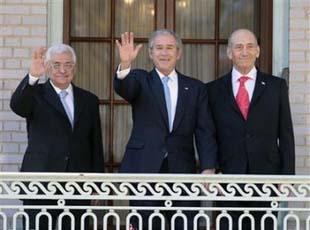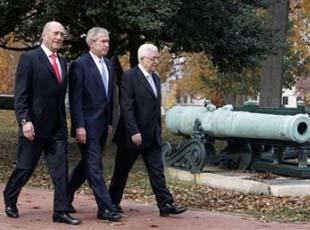World
Backgrounder: Hopes for peace in Middle East
WATCH VIDEO
Source: CCTV.com | 11-28-2007 08:59
Special Report: Mideast Peace Conference

President Bush hosts a meeting with Israel's Prime Minister Ehud Olmert and Palestinian President Mahmoud Abbas during the Middle East peace conference at the U.S. Naval Academy in Annapolis, Maryland, November 27, 2007. (Larry Downing/Reuters)
Washington organized the Middle East Conference in Annapolis to discuss the ongoing 6-decade conflict over land, nationhood and rights that underlies Israel's conflicts with its Arab neighbors.
Hopes for peace are high. But many are skeptical that little in the way of concrete results can be achieved.
The US-sponsored event is the first in seven years.
Hopes for peace are high with the success of the meeting hinging on the cooperation of participants.
Sean Mccormack, Spokesman, US State Department, said, "This conference will signal international support for the courageous efforts of Prime Minister Olmert and President Abbas and will serve as a launching point for negotiations with an eye towards establishing an Israeli and Palestinian state."
The United States has invited over 40 countries, including Saudi Arabia and Syria.
The Israelis and Palestinians have waited a long time for this vision to be realized.
Nabil Abu Rdeneh, Palestinian, Spokesman, said, "We are ready, the Palestinians are ready. We are committed to the Madrid Conference reference land for peace, land which was occupied in 1967. If the Israelis are ready and serious and if the Americans are ready to pressure enough for in order to reach an agreement, there is an opportunity otherwise it would be a long, long, long process."
 |
Israel's Prime Minister Ehud Olmert, U.S. President George W. Bush (C) and Palestinian President Mahmoud Abbas (R) walk together to make their statements to the Annapolis peace conference at the Israel-Palestinian Peace Conference at the U.S. Naval Academy in Annapolis, November 27, 2007. (Larry Downing/Reuters)
But for many, it is not likely that the 1-day peace conference will tackle any of the major issues. Among them defining borders, security, settlements, the status of Jerusalem and the fate of Palestinian refugees.
But analysts say Annapolis will help to push the peace process forward.
Li Shaoxian, Research Fellow, China Inst. of Contemporary Int’l Rel, said, "There won't have a breakthrough on the core issues of final status. But it will be a beginning of a peace process. The run-up to the meeting has been fraught with disputes, skepticism and suspicion about the good faith of the opposing parties. But Bush has been buoyed by the Arab endorsement of the meeting and the possibilities for broader peacemaking. It's the beginning of a peace process and not the end."
However, whatever the Israelis and Palestinians decide to agree upon in Annapolis will be useful as a starting point.
The big questions that have doomed previous peace efforts are looming further down the road.
Editor:Zhang Pengfei



